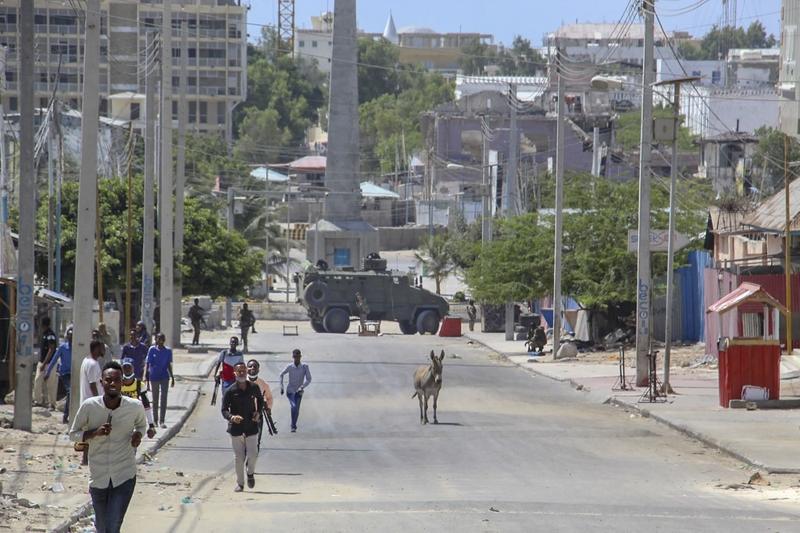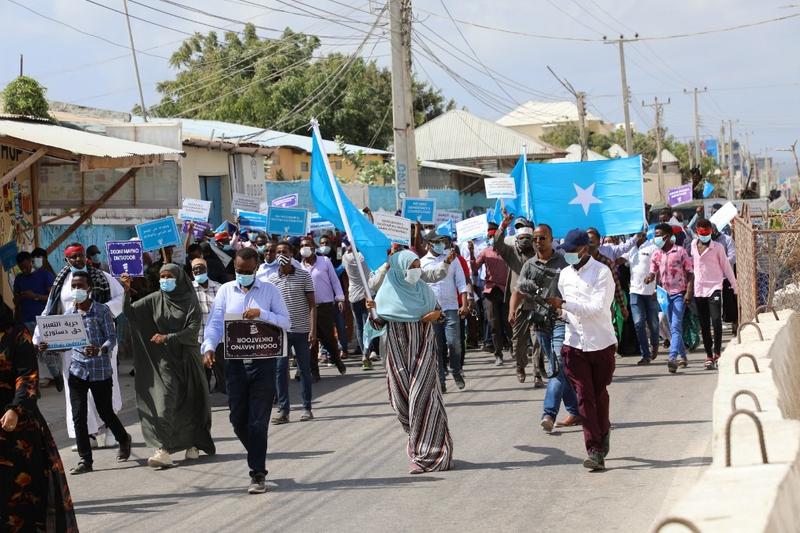 Men flee the site of violent clashes in the Somalian capital, Mogadishu on Feb 19, 2021. (STRINGER / AFP)
Men flee the site of violent clashes in the Somalian capital, Mogadishu on Feb 19, 2021. (STRINGER / AFP)
MOGADISHU - Gunfire and rockets exploded on Friday in Mogadishu as Somali government forces clashed with opposition supporters angered by delayed elections, fighting that could split the military along clan lines and strengthen the al Qaida-linked insurgency.
Somali lawmakers were due to select a new president on Feb 8 but the process was delayed after the opposition accused President Mohamed of packing regional and national electoral boards with supporters
Video sent to Reuters from an anti-government demonstration showed civilians in facemasks - accompanied by friendly soldiers in red berets with ammunition belts wrapped around them - waving Somali flags scattering before gunfire erupted. Reuters journalists nearby could hear intermittent gunfire as well as heavier explosions.
“Many forces heavily attacked us, I am now on my chest in an alley. This is a massacre,” protester Farah Omar told Reuters by phone. He said Turkish-trained special forces troops known as Gorgor were among those attacking demonstrators.
ALSO READ: Arab League urges immediate talks among Somali parties over elections
Another video showed flames where a rocket propelled grenade hit a row of shops opposite the airport entrance.
The spillover of political rivalries into open conflict will dismay Somalia’s allies and play into the hands of the al Qaeda-linked al Shabaab insurgency, which mounts attacks on civilians around East Africa in its bid to install strict Islamic law.
“The military is dissolving and many troops seemingly reverting to clan loyalties,” said Colonel Ahmed Abdullahi Sheikh, who served for three years until 2019 as the commander of Somalia’s elite U.S.-trained Danab unit.
“It’s a mess. There’s no longer any command structure whatsoever.”
“My fear is that many SNA (Somali National Army) outstations will leave their bases to come and participate in the fighting and give more ground to al Shabab. This will really empower al Shabab. Over a decade’s worth of gains might be lost,” he told Reuters.
Overnight attacks
Hours before the demonstrations, Somalia’s former president, Sheikh Sharif Sheikh Ahmed, accused government troops of attacking a hotel where he was staying with another former president ahead of Friday’s rally.
“Farmajo attacked us with armoured vehicles. That is dictatorship. He attacked us and residents at Maida hotel,” Ahmed tweeted after the attack, referring to President Mohammed. “We ask all civilians to come out and respond.”
Somalia’s minister of security Hassan Hundubey Jimale accused the opposition of starting the fighting.
 Supporters of different opposition presidential candidates demonstrate in Mogadishu on Feb 19, 2021. (PHOTO / AFP)
Supporters of different opposition presidential candidates demonstrate in Mogadishu on Feb 19, 2021. (PHOTO / AFP)
“Armed militia attacked government forces. We repulsed and overpowered the militias,” Jimale said in an overnight statement.
Mogadishu resident Ahmed Aden, 44, told Reuters on Friday he had to flee during the night’s gunbattles.
“Last night we took our children and mattresses on our shoulders and fled before war started,” he said. “We returned at gunpoint. Turkish-made armoured vehicles and government forces blocked every road and alley.”
Politics by other means
Without mediation, the fighting has the potential to spread quickly. Somalia has been riven by civil war since 1991; both government and opposition can call on heavily armed supporters.
President Mohamed - often known by his nickname “Farmajo” or “cheese” - is a from the powerful Darod clan. But most military units in and around the city of Mogadishu are from the Hawiye clan - heavily represented in the opposition alliance.
Somali lawmakers were due to select a new president on Feb 8, but the process was delayed after the opposition accused Mohamed, who is seeking a second term, of packing regional and national electoral boards with supporters.
Somalia’s opposition alliance says Mohammed’s term has expired and he is no longer president. The stand-off imperils Somalia’s recent history of peaceful transitions, said former national security adviser, Hussein Sheikh Ali, who now runs the Mogadishu-based Hiraal Institute thinktank.
“Somalia – although known as a failed fragile country – has had some success in terms of power exchanging hands peacefully,” he said. “This is the first time that is under threat.”
READ MORE: Somalia's opposition calls for new national council
Residents were “incensed” about the crackdown on protesters, he said, after the city had welcomed Mohamed - an outsider - as president when he was elected.
“People in this city feel humiliated. They cannot tolerate someone who is not respecting any rule – either the rule of law or the customs of Somalia,” he said.


